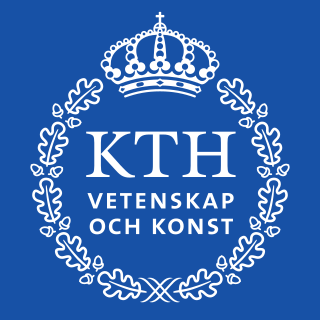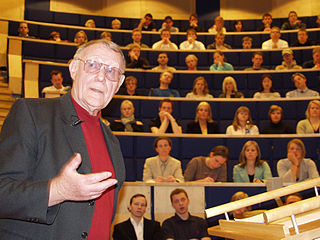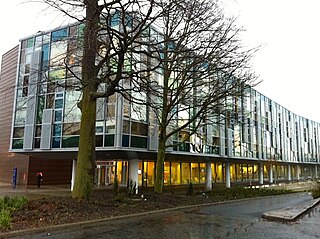
Biotechnology is a broad area of biology, involving the use of living systems and organisms to develop or make products. Depending on the tools and applications, it often overlaps with related scientific fields. In the late 20th and early 21st centuries, biotechnology has expanded to include new and diverse sciences, such as genomics, recombinant gene techniques, applied immunology, and development of pharmaceutical therapies and diagnostic tests. The term biotechnology was first used by Karl Ereky in 1919, meaning the production of products from raw materials with the aid of living organisms.

KTH Royal Institute of Technology, abbreviated KTH, is a public research university in Stockholm, Sweden. KTH conducts research and education within engineering and technology, and is Sweden's largest technical university. Currently, KTH consists of five schools with four campuses in and around Stockholm.
Biotechnology and Biological Sciences Research Council (BBSRC), part of UK Research and Innovation, is a non-departmental public body (NDPB), and is the largest UK public funder of non-medical bioscience. It predominantly funds scientific research institutes and university research departments in the UK.

The University of Natural Resources and Life Sciences, Vienna, or simply BOKU, founded in 1872, is an education and research centre for renewable resources in Vienna, Austria. BOKU combines expertise in the fields of natural sciences, engineering and biotechnology as well as social and economic sciences. In research and teaching, it focuses on

University Putra Malaysia is recognised by the independent government assessments as one of Malaysia's leading research universities offering undergraduate and postgraduate courses with a focus on agricultural sciences and its related fields.

Ingo Potrykus is Professor Emeritus of Plant Sciences at the Institute of Plant Sciences of the Swiss Federal Institute of Technology (ETH), Zurich from which he retired in 1999. His research group applied gene technology to contribute to food security in developing countries. Together with Peter Beyer, he is one of the co-inventors of golden rice. In 2014 he was chairman of the Golden Rice Humanitarian Board.
The Estonian University of Life Sciences, located in Tartu, Estonia, is the former Estonian Agricultural University, which was established in 1951 and renamed and restructured in November 2005.
The Department of Biotechnology (DBT) is an Indian government department, under the Ministry of Science and Technology responsible for administrating development and commercialisation in the field of modern biology and biotechnology in India. It was set up in 1986.

KIAA0999 protein is a protein that in humans is encoded by the SIK3 gene.

The National Institute of Molecular Biology and Biotechnology, also known as NIMBB, is a research institute of the University of the Philippines. It has four branches which are located in UP Diliman (NIMBB-Diliman), UP Los Baños (BIOTECH-UPLB), UP Manila and UP Visayas.
The MicVac method is a pasteurization method for the food processing industry producing ready meals. Food ingredients are inserted into a package, which is sealed. The food is then cooked and pasteurized in the sealed package. During the heating process a valve on the package opens and releases steam and oxygen. The process time is short since the food is pasteurized with microwaves. When the microwave heating process stops the valve closes. Remaining steam condenses and causes an underpressure in the package. The final result is a cooked, pasteurized and vacuum-packed product. The short cooking time in combination with the absence of oxygen in the pack is unique for the method and has many advantages. The method has been used in the food industry since 2005.

Linnaeus University (LNU) is a state university in the Swedish historical province (landskap) Småland, with two campuses located in Växjö and Kalmar respectively. Linnaeus University was established in 2010 by a merger of former Växjö University and Kalmar University, and is named in honour of the Swedish botanist Carl Linnaeus.

Bioscience, Biotechnology, and Biochemistry is a monthly, peer-reviewed, scientific journal published by the Japan Society for Bioscience, Biotechnology and Agrochemistry, of which it is the official journal. It was established in 1924 as Bulletin of the Agricultural Chemical Society of Japan, which was renamed to Agriculture and Biological Chemistry in 1961. The journal took its current name in 1991.

The regulation of genetic engineering varies widely by country. Countries such as the United States, Canada, Lebanon and Egypt use substantial equivalence as the starting point when assessing safety, while many countries such as those in the European Union, Brazil and China authorize GMO cultivation on a case-by-case basis. Many countries allow the import of GM food with authorization, but either do not allow its cultivation or have provisions for cultivation, but no GM products are yet produced. Most countries that do not allow for GMO cultivation do permit research. Most (85%) of the world's GMO crops are grown in the Americas. One of the key issues concerning regulators is whether GM products should be labeled. Labeling of GMO products in the marketplace is required in 64 countries. Labeling can be mandatory up to a threshold GM content level or voluntary. A study investigating voluntary labeling in South Africa found that 31% of products labeled as GMO-free had a GM content above 1.0%. In Canada and the USA labeling of GM food is voluntary, while in Europe all food or feed which contains greater than 0.9% of approved GMOs must be labelled.
The School of Agricultural and Life Sciences is a French public and national Grande Ecole in agricultural and life sciences, funded by the Ministry of Higher Education and Research and member of Toulouse Tech. The ENSAT is a school of the National Polytechnic Institute of Toulouse (INPT), a university federating several schools dealing with engineering, agriculture and veterinary sciences, chemistry, meteorology.
RISE Research Institutes of Sweden AB (RISE) is a Swedish state-owned research institute, collaborating together with universities, industry and the public sector to drive international competitive sustainable development and growth.

The Roslin Institute is an animal sciences research institute at Easter Bush, Midlothian, Scotland, part of the University of Edinburgh, and is funded by the Biotechnology and Biological Sciences Research Council.
Gopalasamudram Sitaraman Venkataraman (1930–1998) was an Indian botanist, academic and the director of the Indian Agricultural Research Institute (IARI), New Delhi. He was also a director of the DBT Centre for Blue-Green Algae at Madurai Kamaraj University and a recipient of the VASVIK Industrial Research Award and Om Prakash Bhasin Award. The Government of India awarded him the fourth highest civilian honour of the Padma Shri in 1992.
Tilak Raj Sharma is an Indian plant biologist, the executive director of the National Agri-Food Biotechnology Institute (NABI), and the chief executive officer of the Center of Innovative and Applied Bioprocessing (CIAB), both autonomous institutes under the Department of Biotechnology. Known for his studies in the fields of genomics and plant disease resistance, Sharma is an elected fellow of the National Academy of Sciences, India, the National Academy of Agricultural Sciences and the Indian National Science Academy. The Department of Biotechnology of the Government of India awarded him the National Bioscience Award for Career Development, one of the highest Indian science awards, for his contributions to biosciences in 2007.










